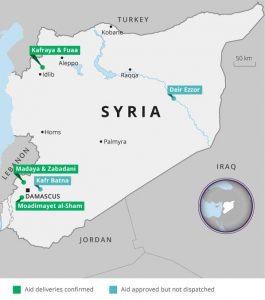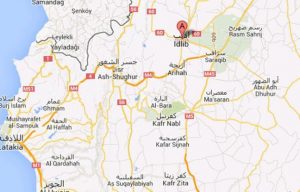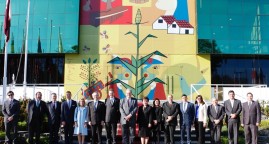Syria: Dispite of the agreement of “cessation of hostilities” the delivery of humanitarian aid is complex
Jean-René Belliard analyzes the Middle East
According to the UN Food Program, more than 486,000 people are besieged in 18 different parts of Syria.
The town of Madaya, in the northwest of Damascus, is encircled for eight months by Hezbollah and the regime’s troops. The humanitarian tragedy that affects its inhabitants had already attracted the attention of international opinion.
The UN had sent twice food and medical aid to Madaya but also to Zabadani, another Sunni village surrounded by Hezbollah and the Syrian army, and also in Fuah and Kafraya, two Shiite communities in the west Aleppo.
The International Support Group on Syria, announced last week, under the co-presidency of the United States and Russia, an agreement for a “cessation of hostilities” in Syria from 27 February to midnight.
En conséquence, 29 février, un autre enfant est mort à Madaya parce qu’il n’avait pas pu bénéficier d’une aide médicale et de médicaments.
The agreement also provided for the delivery of humanitarian aid as soon as possible to the circled areas.
However, according to local sources, only al-Sham Mouadamiyat, a city besieged by regime forces in southwest of Damascus, was able to receive humanitarian aid. After a long wait imposed by regime forces, only trucks including food parcels and hygiene products could enter the city. Medical packages and drugs were not allowed.
Accordingly, on February 29, another child died at Madaya because he did not receive medical assistance and drugs.
There would be about 400 people seriously ill, only in Madaya. Only four of them were able to leave the besieged city on 12 February.
The situation is the same in the eastern Ghouta where medical aid has finally reached after the death of two sick people.
The UN announced parachuting, February 24, of 21 tons of aid to Deir-ez Zhor, a city east of Syria, under partly control of Daech.
The UN also announced that aid would reach Madaya, Zabadani and Fuah Kafraya on February 28th, but no convoy arrived in these localities.
UN announces the delivery of new humanitarian convoys Thursday, March 3th
The deputy spokesman of the UN Secretary General, Farhan Haq, said that aid convoys to various humanitarian agencies will be sent on Thursday, March 3th to Kafr Batna in eastern Ghouta.
At a press conference held at the UN headquarters in New York, Haq said that these convoys will transport food and medical supplies for about 20,000 people, adding that “security authorities banned the entry of surgical equipment.”
Haq added that other humanitarian convoys will be sent Saturday, March 5th in four Syrian cities, namely Madaya, Zabadani and Fouah Kafraya.
The UN official said the World Health Organization (WHO) presented five requests to the Syrian government to send medicine and medical equipment to 2.5 million people in 53 areas under siege. “The Syrian authorities accepted the delivery of aid to Duma and Madaya, while other requests are outstanding,” said he said.
John Kerry very critical of Assad
Monday, February 29, John Kerry, head of US diplomacy, had severely criticized the regime for the obstacles that required the transport of humanitarian aid.
“Can you at least try to have some ethics,” he asked at the Syrian authorities.
The resumption of negotiations depends on the delivery of humanitarian aid
The UN Special Envoy for Syria, Staffan de Mistura announced that in case of compliance with the cease-fire and the delivery of aid, negotiations could resume in Geneva March 7th.


The Syrian Arab army attack towards Jisr al-Choughour
The fact that the Al-Nusra Front, the branch of al Qaeda in Syria, is not included in the agreement of “cessation of hostilities” allows the Syrian Arab Army (SAA) to continue the fight against the forces rebels associated with al-Nusra Front.
This is the case of the offensive has launched the 103rd Brigade of the ASA and the Syrian marines towards the Kabani strategic village on the M-4 road connecting Aleppo to Latakia.
The town of Kabani is in the hands of rebels Jeich al-Fateh (the conquering army) which, theoretically, is involved in the cease-fire agreement. But Syrian state media justified the operation by claiming that it is the Al-Nusra Front, which holds the village.
The 103rd Brigade ASA attacked Kabani on its southern flank, while the soldiers of the Marine Infantry progressing along the road M-4.
The catch of Kabani allow loyalist forces advancing towards the town of Jisr al-Shoughour to the rebels of Jeich al-Fateh.

After the resumption of Khanasser-Aleppo road, the army is preparing an offensive against the province of Raqqa
After the takeover by the Syrian Arab Army (SAA) for the strategic road linking Ithriya in Aleppo, the central command of the ASA ordered his troops to assemble in the village of Ithriya, south of Khanasser in order to a new offensive against the Islamic State.
Syrian soldiers are being deployed in the Ithriya sector in the province of Hama, for a storm to the west of the province of Raqqa, a stronghold of the Islamic State. The operation aims to resume Tabaqa military airport currently in the hands of the IU.
This will be the largest military operation against the Islamic State since the beginning of the presence of jihadists in Syria.
The city of Ithriya, located in the Syrian desert, is strategically located in the north-eastern province of Hama. It borders the province of Aleppo in the north and is located 15 km west of the axis connecting Raqqa. The offensive could begin in the coming days.
Jean-René Belliard, now a consultant, has made numerous and long stays in Lebanon and especially during the most dramatic hours of the war. He publishes a daily newsletter available to subscribers only. It provides a daily summary of the key events happening in the Middle East and North Africa, compiled from information collected on site by a dozen correspondents.
Discover the blog (only in french)
Related Articles
The Grand Master at the Central American Integration System (SICA)
02/16/2016. In the Central American Integration System headquarters, Fra’ Matthew Festing met the Secretary General.
Good Foreign Policy Is Invisible
02/28/2017. The problem is that successful foreign policy is largely invisible. Sometimes, successful foreign policy even means keeping real victories quiet.
Speech of the Lieutenant of the Grand Master to the Diplomatic Corps accredited to the Sovereign Order of Malta
01/09/2018. “Today’s occasion gives me the opportunity to retrace with you a full and demanding year, in which the Sovereign Order of Malta has had to contend with great and unprecedented humanitarian challenges…”





